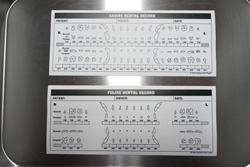|
|

Dentistry
Dental disease is the most common health problem of pets. In fact, 85 to 90% of all dogs and cats over the age of six years have periodontal (gum) disease. Most dental diseases in dogs and cats (and in people) are caused by deposits of plaque (an accumulation of old cells, saliva and bacteria) building up on the teeth. As the plaque hardens, it turns into a substance called tartar, or calculus. The accumulation of tartar can reach such proportions that the tooth becomes lost within a shell of brownish, foul-smelling material. This condition seriously inflames the gums (gingivitis), and leads to the breakdown of the periodontal tissues (periodontitis), which secure the teeth to the surrounding bone and gum tissue. If left untreated, periodontal disease can cause a dog or cat to lose its teeth.
Other dental problems that require treatment include abscesses caused by broken or worn teeth, as well as advanced periodontal disease, structural problems caused by improper tooth alignment and/or abnormal numbers of teeth, pulpitis (infection and deterioration of the inside of the tooth), and osteomyelitis (bone infection), which can affect the jawbone.
Dogs develop 28 temporary teeth at two to three weeks of age. Their 42 permanent teeth emerge at about four to five months. Studies show that by age 3, 80% of dogs exhibit signs of gum disease. Small dog breeds are more likely than large breeds to develop periodontal disease. Canine dentistry experts believe this is because the teeth of small dogs often are too large for their mouths, forcing the teeth closer together.
Cats have about 26 temporary teeth at two to three weeks of age. Their 30 permanent teeth erupt at about four months. According to studies, about 70% of cats have signs of gum disease by age 3. Cervical line lesions are the most common tooth disease in domestic cats. Studies show that about 28% of domestic cats develop at least one of these painful lesions during their lifetime.
Home Care
In addition to providing regular dental checks for their pets, pet owners can take steps at home to ensure good oral health. The following list of home oral care tips can be done simultaneously for the most comprehensive prevention of dental disease.
 |
Brush your pet’s teeth daily with specially formulated toothpaste in flavors appealing to dogs and cats. Toothpaste for humans should not be used because it can cause an upset stomach. Daily teeth brushing is the “gold standard” and single most effective preventative step you can take for the health of your pet’s mouth. Invisible plaque accumulates constantly on the tooth’s surface, and turns to tartar if left for just a few days in a row. Therefore, brushing less than three times weekly is nearly completely ineffective. To ensure acceptance, teeth brushing should be started gradually, and always combined with a positive reward like a favorite treat or toy, or a play session. Ask us for a teeth brushing demonstration at your pet’s next appointment! |
 |
Feed a specially formulated pet food with proven oral health benefits. We recommend Hill’s t/d for dogs or cats, as well as Royal Canin Dental for dogs or cats. These prescription dental health diets are well-balanced and highly nutritious, but also have specially formulated kibble to improve your pet’s oral health by reducing plaque and tartar accumulation. Interested in an over-the-counter option? Check out Hill's Healthy Advantage Oral+ for dogs or cats. |
 |
A water additive is an easy step to take to improve your dog’s or cat’s oral health. We offer the HealthyMouth anti-plaque water additive in unflavored, chicken, or salmon flavors. Suitable for multi-species households, this additive is safe for both dogs and cats, and is one of the only water additives recommended by veterinary dentists. Visit HealthyMouth.com to read more about it, and pick up a bottle at Alpine today! |
 |
Does your dog like to chew? If so, make sure he or she is chewing on bones & treats that are also benefiting his or her oral health! Pick up a bag of CET chews (enzyme-impregnated rawhide chews) at Alpine today. Select chew bones carefully - if you cannot indent the bone with pressure from your fingernail, it is too firm and may cause a dental fracture. |
 |
Have you noticed that most of the dog toys and chew treats at the pet store have label claims that they are for oral health or tartar control? Well, many of them are not effective. The Veterinary Oral Health Council was created to review products for their effectiveness in reducing plaque and tartar build-up. A product (diet, treat, toy, water additive, etc.) will earn a VOHC seal of approval if they demonstrate effectiveness at plaque and tartar reduction with regular use. Visit vohc.org today to read more about products you and your pet can use to keep their mouth healthy. |
 |
Similar to human mouthwash, our oral hygiene rinse contains an antiseptic solution to reduce bacteria in the dog and cat mouth. This reduces the amount of plaque and tartar accumulating. Easy to squirt into your pet’s mouth, come in and pick up a bottle today to improve your pet’s oral health. |
 |
Take pet dental health to heart and make a commitment to provide routine dental care. Studies show that proper care of teeth and gums is at the heart of a total health care program for dogs and cats. Bacteria in your pet's mouth can lead to infections that eventually enter the bloodstream and could infect the heart, liver and kidneys. Don't let this happen to your best friend! |
|
 Dentistry cards Dentistry cards
|
|